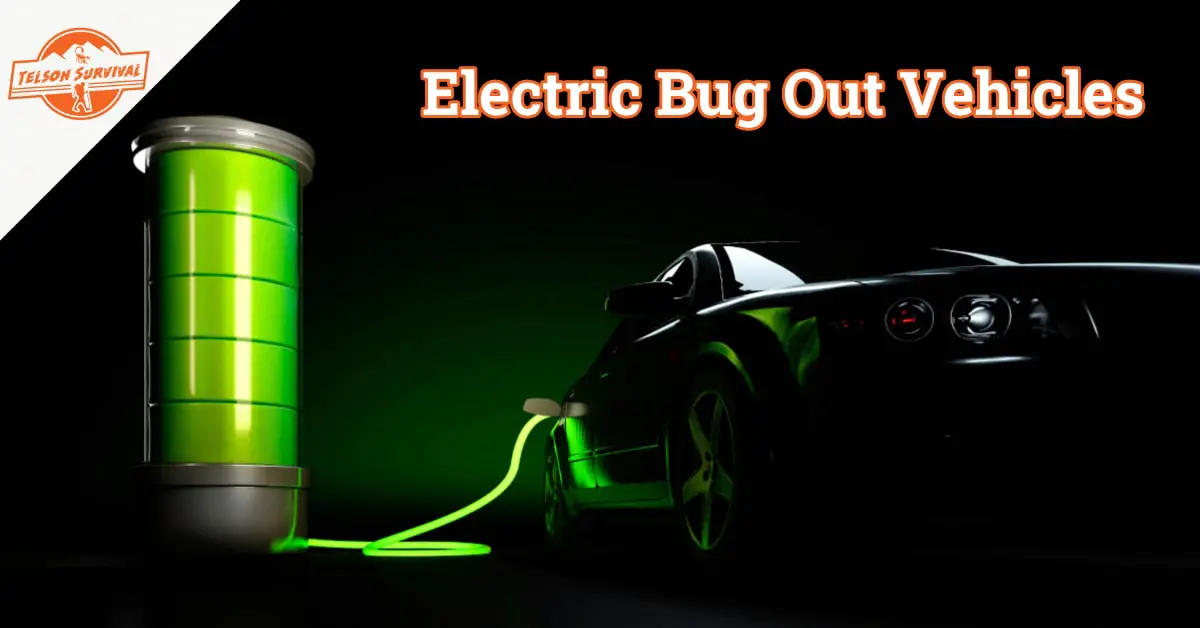When SHTF, supply chain problems are bound to arise in one way or another. The energy sector (and petroleum industry, specifically) could be among the hardest hit. Is the electric car finally ready to pick up the slack?
Bugging out during the end of the world will require some resources, not least of which is reliable transport. No one knows what the future of petroleum products looks like in the long term. In the event of a total existential disaster, is an EV a safe bet?
Prepper electric cars are vehicles manufactured or modified for handling and accommodating survivalists and their lifestyles. They are powered by electricity, which would be an advantage over conventional gas or diesel-powered engines. These cars can also circumvent any failure in the grid because they can be charged using alternatives like solar.
What is a prepper electric car?
A prepper car is a car that is manufactured or modified in anticipation of total societal collapse. Usually, they feature extra rugged bodies and tires, as well as amenities that are oriented towards survivalism.
Electric prepper cars are all of those things, but with one key exception…electric motors instead of a traditional combustion engine. Because EVs are relatively new, there is no uniform standard for the design and layout of electric motors. As such, different manufacturers can have totally different approaches to this aspect.
The one feature they all share is the need to be recharged. At the time of writing, the average range of fully charged electric cars is around 180 miles.
This figure is on the rise though, with 300+ mile EVs becoming increasingly common. Depending on the nature of doomsday, and social response to it, you may be forced to travel long distances during evacuation.
Electric bug out bag cars: advantages & disadvantages
Electric vehicles, as we all know, are quite pricey, and they can require special considerations. Therefore, you need to know the upside and the downside before such an investment.
Let's kick off with the advantages of a prepper electric car. Of course, the number one benefit of owning an electric vehicle is saying goodbye to gas (and its associated costs) forever.
As gas prices continue to rise, so does the appeal of electric vehicles. Many people are now getting increasingly frustrated with the running costs of refueling their gas guzzlers, and are only biding their time until electric cars become more affordable.
Also, it is unclear whether gas would be readily available were SHTF. Depending on the nature of doomsday and its aftermath, petroleum supply chains might be severely disrupted or eradicated. This would result in gas-powered vehicles being rendered completely useless, and electric vehicles would be king.
Electric cars may be quite costly to purchase, but they are surprisingly cheap to maintain. The absence of a combustible engine and other related parts means electric cars do not require regular services or lubrication replacements like their gas-powered counterparts.
If the post-apocalyptic world is a hostile one, it might be a good idea to try to keep a low profile at times. Electric vehicles can (somewhat) help in this regard because they are very quiet. A car that doesn’t start with the sputter of a combustion engine could buy you just enough of a headstart over would-be capturers. Far-fetched, but you never know.
Electric cars also shine in the safety department. Again, the absence of an engine is key here. Electric vehicles have a lower center of gravity than gas-powered vehicles of the same build type. This reduces the chances of flipping over during an accident. Also, EVs don’t have fuel tanks filled with highly flammable bomb juice, which helps.
Another major advantage to getting an electric car is the benefit to the environment. EVs are entirely emission-free, with no exhaust fumes or any of the other nasty gases combustion engines regularly churn out. Getting a bug-out EV would also help you get (and stay) on the side of any upcoming anti-emission laws.
Now, let’s address the negatives regarding electric bug out vehicles, starting with environmental concerns. Questions remain over the long-term environmental impact of EV batteries. Currently, EVs use Lithium-ion batteries, that require extra special care when disposed of because of their toxicity.
Sticking to the battery theme, let’s discuss what is perhaps the biggest problem with EVs today…charging.
Firstly, charging infrastructure is not as widespread as conventional gas stations. Only Tesla has a noteworthy network of public charging outlets in North America…and they are only compatible with Tesla vehicles. Therefore, if you plan on bugging out in anything other than a Tesla, you better hope that this problem is resolved before SHTF.
Secondly, it can take AGES to completely charge EV batteries, especially when charging at home. This is a frustrating impediment that forces you to carefully plan your movements well ahead of time.
Another spinoff from the lack of universal charging stations is that long distances are just not an option for non-Tesla owners. The range is still limited and you always need to keep one eye on your battery to avoid running out of juice in the wrong place. Not good if you plan on long excursions in a post-apocalyptic wilderness.
As we have already suggested, EVs are quite pricey, and many manufacturers include optional extras that push the price even higher. Deep pockets would certainly be a great help.
Prepper vehicles: gas vs. electric
In the society we live in today, there is no question that gas-powered vehicles hold an edge over EVs. However, with one eye on a potentially dystopic future, the underdog has a fighting chance.
The main decider has to be fuel. Right now, you cannot go a few miles in any direction without coming across a service station. However, were society and the economy to crumble, petroleum supply would be impacted greatly.
EVs have an advantage here because they use electricity. Even if the main utility grid was to fail, preppers could still charge their cars at home with a number of alternative energy sources.
The issue of little choice is one that counts against EVs as well. Right now, it's almost Tesla or nothing in the EV market, although you should expect that to change. Meanwhile, there are countless combustion vehicles you can adopt as a bug-out ride.
Best prepper electric car options
“Car”, for the purposes of this article, includes sedans, coupes, SUVs, pickups, and RVs. I don’t know about you but personally, “bugging out” evokes thoughts of off-roading through miles of treacherous forest and desert roads in a souped-up dune buggy. However, that is not always the case, and several factors can influence the best bug out car for you.
If you already have a standalone bug out home or bunker, you are less inclined to go for a vehicle that you can live in. You will simply need a vehicle for your errands and basic point A to B.
If you have regular home and expect forced relocation when SHTF, you should seriously consider investing in an electric recreational vehicle. For some, owning an RV is the ultimate show of dedication to living off the grid. The battery-powered mobile home industry is very much in its infancy, but our tongues are already wagging in anticipation.
The WOF Iridium is the first glimpse of an all-electric bug out RV. This beast boasts an impressive 250 miles of range. Expect more manufacturers to dive headfirst into this burgeoning market.
The prepper mentality is about being ready for any eventuality. No one knows when or how a disaster will strike, or how society will respond. You will need a vehicle that serves as many purposes as possible while offering healthy compromises. Electric SUVs and pickup trucks fit the requirements by perfectly straddling the line between "run-around car" and "cross country mobile home".
SUVs and pickups are arguably the best options for bugging out. They are spacious and adept at both on-road and off-road driving. They are quicker and easier to maneuver than RVs, not to mention less conspicuous. They also (usually) offer great comfort and entertainment features.
Tesla’s upcoming Cybertruck is the undoubted poster boy for this class of vehicle. Elon Musk continues to defy gravity, with the cybertruck’s cultural impact destined to spark a new wave of rugged electric monsters. Also keep an eye out for the beautiful Fisker Ocean, an awesome little off-roader that is scheduled for a 2022 release.
When choosing the best electric car for your survivalist mission, you will have to start by assessing your current and future needs as well as costs. You also need to be certain of your SHTF living situation before committing money to any vehicle purchases or modifications.
Prepper Electric Cars Conclusions
There is no doubt that electric cars are the future of automotive transport, with more and more manufacturers entering this market and expanding the range of available choices. However, their compatibility with the prepper lifestyle is, and will remain unclear until the day S truly HTF.
Keep your eyes peeled for more exciting developments in the EV world, as more and more vehicles enter the fray and expand the range of choices.










